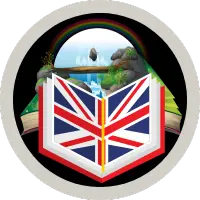Household chores are tasks that we do to keep our home tidy. In this English vocabulary lesson, we will learn the names of common household chores in English with pictures to help you memorise them easily. After this lesson, you will be able to talk about them with your friends.
1. List of common household chores
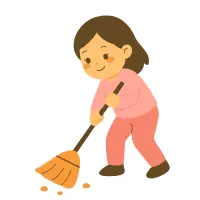
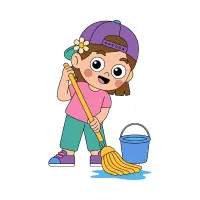
To mop means to clean the floor using a mop and water (🪣).
1. The floor looks dirty. You need to mop it more often.
2. Be careful! The floor is slippery. I’ve just mopped it.
sweepTo sweep means to clean the floor using a broom (🧹).
1. Please sweep the floor before you mop it.
2. Can you sweep the front side of the garage?
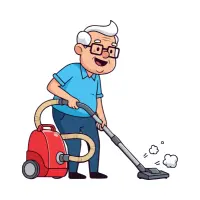
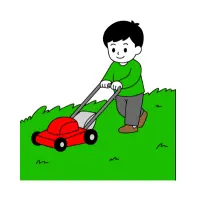
To clean the floor using a vacuum cleaner.
1. I’m tired, but I still need to vacuum the living room.
2. This carpet is dusty. I need to vacuum it.
mowTo mow means to cut the grass using a lawn mower.
1. The grass is still wet. You should wait a few hours before you mow it.
2. When are you free to mow the garden?
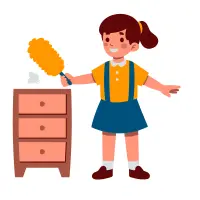
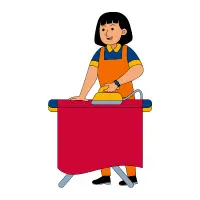
To dust means to remove dust from furniture or other surfaces using a cloth or duster.
1. You forgot to dust the TV stand.
2. Do you have something to dust the furniture?
ironTo iron means to remove wrinkles from clothes using a hot iron.
1. Do you usually iron your clothes?
2. Can you iron my suit, please?
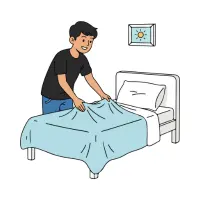

To arrange the sheets, blankets, and pillows neatly after sleeping.
1. My parents taught me how to make a bed properly.
2. Kids, you can’t play before you make your bed.
wash the dishesTo clean plates, cups, and other kitchen items after a meal using water and soap.
1. My children like to help me wash the dishes.
2. It’s your turn to wash the dishes today.
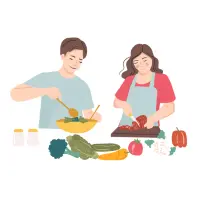
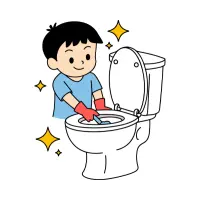
To prepare food for eating using heat.
1. She loves to cook for her family.
2. What are you going to cook for dinner?
scrub the toiletTo clean the inside of the toilet using a brush and cleaner.
1. Don’t forget to scrub the toilet if you see stains.
2. Wear gloves when you scrub the toilet.
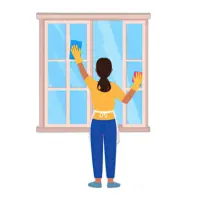
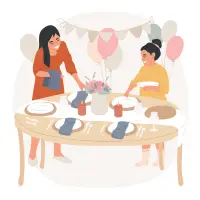
1. Have you also cleaned the windows?
2. You can use this substance to clean the windows.
set the tableTo put plates, glasses, and cutlery on the table before a meal.
1. Can you set the table, please?
2. The food is almost ready. You can set the table now.
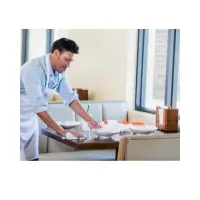
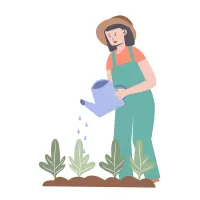
To remove tableware after a meal.
1. Please clear the table before you leave.
2. Have you cleared the table?
water the gardenTo pour water onto the plants so they can grow.
1. How often should I water my garden in summer?
2. I’m almost done with my household chores. I just need to water the garden and I’m done.
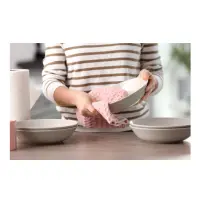
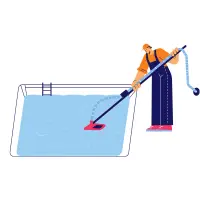
To remove water from clean dishes.
1. I wash and you dry the dishes, okay?
2. You don’t have to dry the dishes. You can just put them on the dish rack.
clear the poolTo remove objects from the pool.
1. You should clear the pool before you swim in it.
2. We have to wait a bit. They are still clearing the pool.

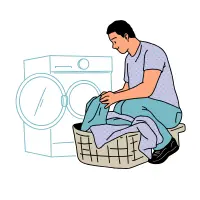
Gardening involves taking care of the plants in the garden.
1. I usually spend my weekends gardening.
2. Kids can do gardening as an extracurricular activity at our school.
do the laundryTo clean clothes using a washing machine.
1. I’ll join you after I do the laundry.
2. I do the laundry once a week.
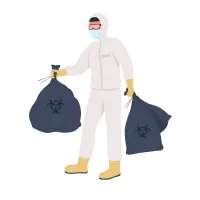
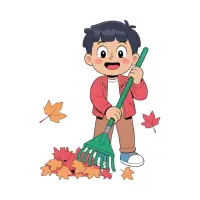
Carry the garbage from your house to the rubbish bin outside.
1. Take the rubbish out when you leave.
2. Can you take the rubbish out?
rake the leavesto gather fallen leaves using a rake.
1. We need to rake the leaves before it rains.
2. Can you help me rake the leaves?
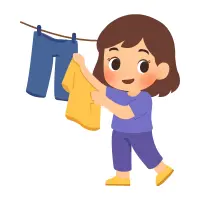
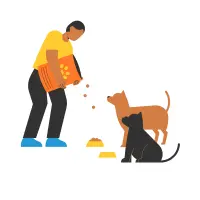
To put wet clothes on a rope or rack (outside) to dry.
1. Your mother is hanging the clothes out.
2. There’s a rack to hang the clothes on if the rope is full.
feed the petsto give food to the pets.
1. Can I feed your dogs?
2. Don’t feed the birds.

To bend clean clothes neatly so they can be stored.
1. Help your mother fold the laundry.
2. Do you know how to fold a suit?
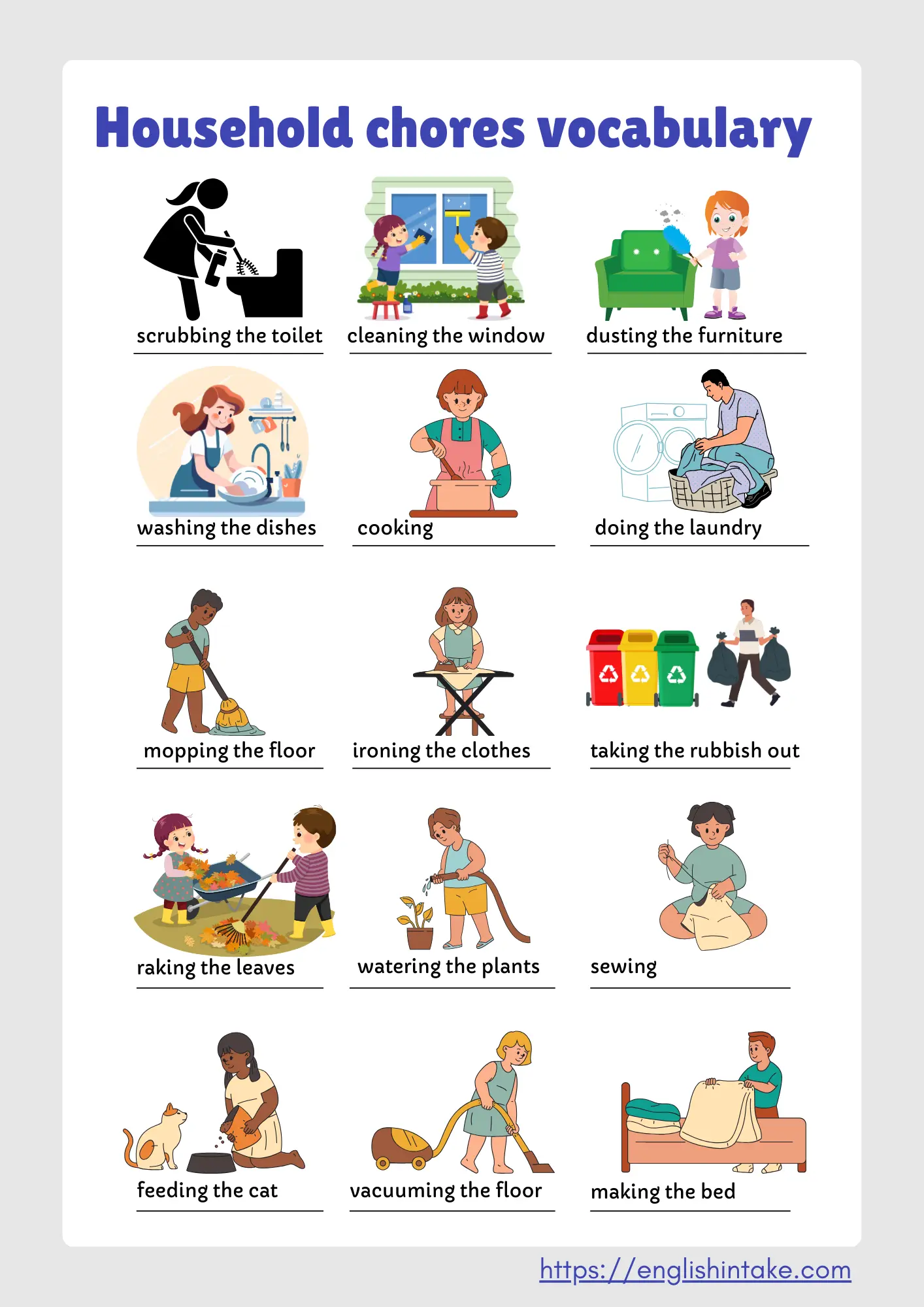
In the next lesson, we will learn how to use these vocabularies in sentences.
2. How to talk about your domestic tasks?
To help you remember the vocabulary, talk about your daily activities at home with your friends. To talk about regular activities, use the present simple tense.
What chores do you enjoy? Which ones don’t you like? Do you have any special ways to save water? What do you do to make the activities fun? Learn to talk about likes and dislikes while discussing these with your partners.
Also check out our lesson on vegetables names in English and kitchen utensils. Here are some examples that you can use:
- I hate chopping onions. It makes me cry.
- I enjoy cooking with my wife.
- I don’t usually wear an apron when I’m cooking.
- I prefer to wash dishes manually rather than using a dishwasher.
- I usually use a knife to peel vegetables.
- We bake our own bread for breakfast.
- We usually cook rice for lunch.
